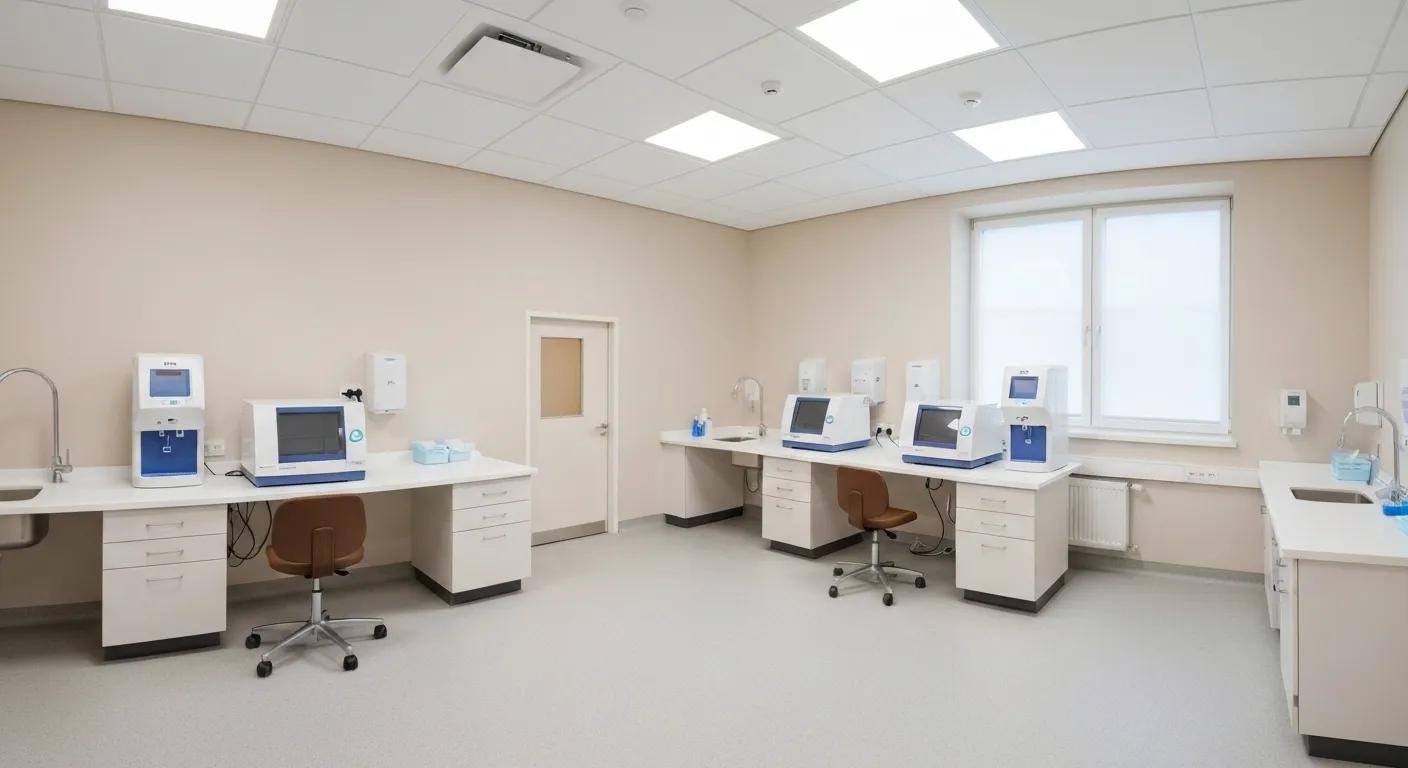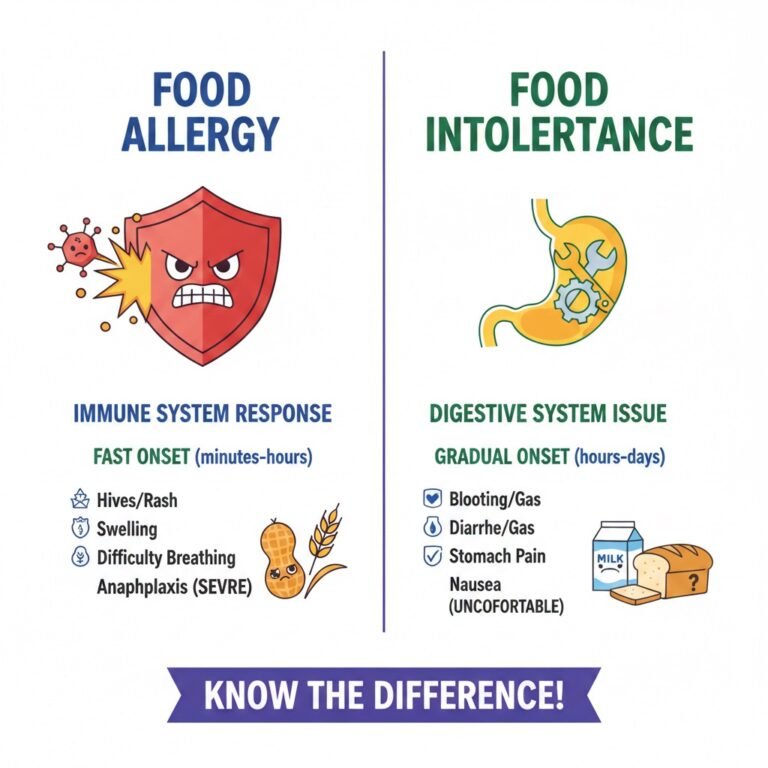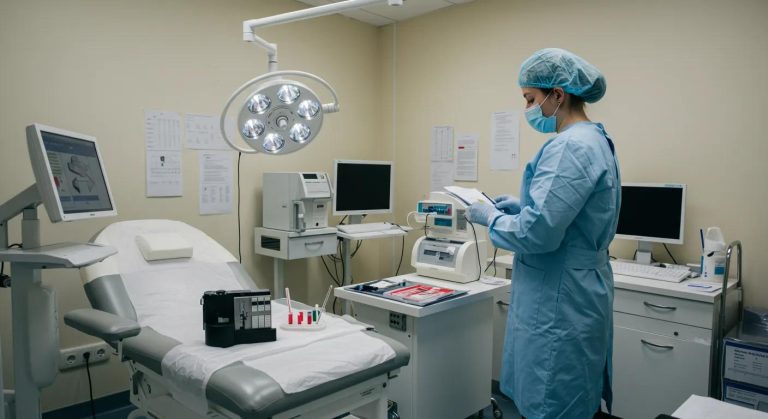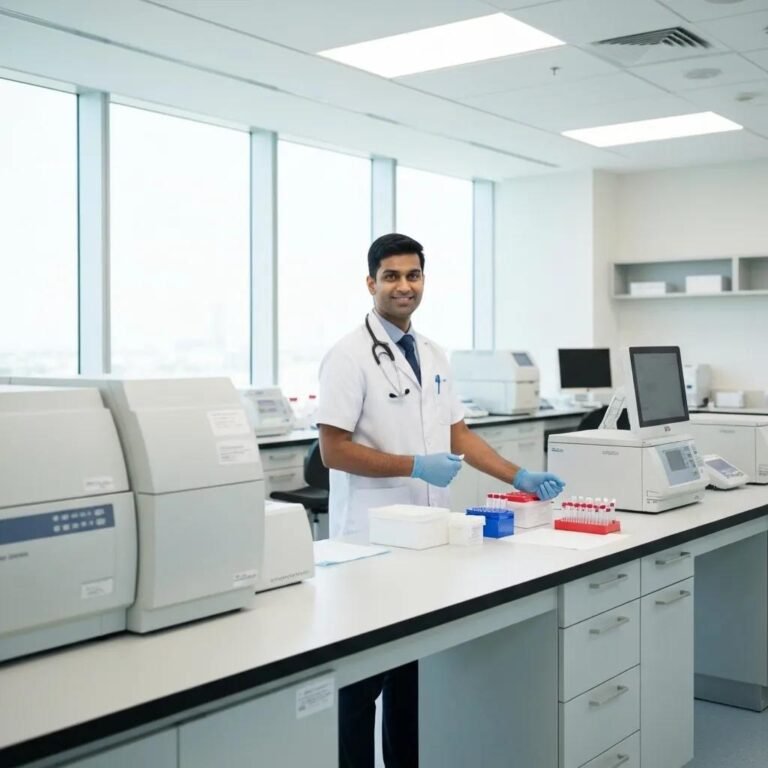Simplified Steps for Your Semen Analysis Test Procedure
Simplified Steps for Your Semen Analysis Test Procedure

Semen Analysis Test Procedure Steps Simplified for You: Complete Guide to Male Fertility Testing and Vasectomy Confirmation
Understanding the semen analysis test procedure steps is essential for reliable fertility assessment and post-vasectomy confirmation without guesswork. Many men face confusion about preparation, sample collection, lab processing, and result interpretation, which can delay diagnosis or sterile clearance. This guide delivers clear definitions, practical mechanisms, and direct examples to simplify each phase—from why the test matters and how to prepare, through step-by-step collection and laboratory analysis, to understanding your results, clinical uses, costs and booking in Dubai, common patient inquiries, and choosing Lab Tests Dubai for accuracy and privacy.
What Is a Semen Analysis Test and Why Is It Important?
A semen analysis test is a laboratory evaluation of a man’s ejaculate that measures sperm count, motility, morphology, volume, pH and liquefaction time to assess fertility or confirm vasectomy success. By quantifying these parameters, the test identifies potential male-factor infertility causes or verifies sterility after vasectomy, guiding treatment or reproductive planning. For example, a low sperm count may prompt lifestyle interventions or specialist referral to improve conception chances.
What Does a Semen Analysis Evaluate?
- Sperm concentration in millions per milliliter to detect oligospermia or azoospermia.
- Progressive motility percentage to assess sperm’s forward movement essential for fertilization.
- Morphology rate according to WHO 2021 criteria to gauge structural normalcy.
- Volume of ejaculate to identify low-volume issues.
- pH level for infection or seminal vesicle function.
- Liquefaction time to ensure proper fluidity for sperm transport.
These measurements establish a comprehensive profile of sperm health and physiological environment for fertilization, which informs clinical recommendations.
How Does Semen Analysis Help Diagnose Male Infertility?
Semen analysis diagnoses male infertility by revealing abnormalities in sperm production, function or ejaculate quality that impair fertilization. For instance, a combination of low motility and abnormal morphology may indicate testicular dysfunction or genetic factors. Detecting these deficits early empowers targeted interventions such as hormonal therapy, assisted reproduction or surgical correction, improving conception outcomes.
Why Is Semen Analysis Used for Post-Vasectomy Confirmation?
After a vasectomy, semen analysis confirms sterility by demonstrating azoospermia (no sperm detected) or only nonmotile sperm over two consecutive samples. Testing typically begins 8–16 weeks post-procedure after approximately 20 ejaculations to clear residual sperm. Achieving confirmed azoospermia eliminates pregnancy risk, allowing safe discontinuation of other contraceptive methods.
How Should You Prepare for a Semen Analysis Test?

What Is the Recommended Abstinence Period Before Testing?
A 2–7-day abstinence period optimizes sperm concentration and motility by balancing ejaculate renewal and avoiding overaccumulation. Shorter intervals may yield low counts, while longer intervals risk reduced motility and higher DNA fragmentation. Adhering to the recommended window ensures consistency with WHO guidelines.
Which Medications and Lifestyle Factors Affect Test Accuracy?
Medications such as testosterone supplements, certain antibiotics or chemotherapy can alter sperm production, and lifestyle factors like heavy alcohol intake, tobacco use or high-fever illness reduce motility and count. Disclose all prescriptions and recent illnesses to your healthcare provider, and avoid recreational drugs, excessive caffeine and alcohol for at least two weeks before testing.
How Should You Collect and Handle the Semen Sample?
Collect your semen sample by masturbation into a sterile, wide-mouth container provided by the lab. Ensure hands and genitals are clean and avoid lubricants. Deliver the sample to the clinic within one hour, kept at body temperature to preserve viability. If home collection is necessary, use a lab-approved transport kit and follow instructions precisely.
What Are the Differences Between Clinic and Home Sample Collection?
| Collection Setting | Convenience | Control | Transport Time |
|---|---|---|---|
| Clinic Room | Immediate drop-off | Supervised privacy | Zero delay |
| Home Kit | Comfort of home | Self-managed steps | Up to 60 minutes |
What Are the Step-by-Step Procedures of the Semen Analysis Test?
What Happens When You Arrive at the Lab for Semen Collection?
Upon arrival, you register at reception and receive a sterile container. A private collection room ensures comfort, and staff review preparation compliance and answer questions. Confirming identity and paperwork completes the initial procedure step before you provide the sample.
How Is the Semen Sample Collected and Processed?
After collection, the sample container is sealed and labeled with patient details and collection time. Lab technicians incubate the specimen at 37 °C to liquefy, then mix gently and prepare aliquots for microscopic and automated analysis. Chain-of-custody protocols safeguard sample identity.
What Laboratory Techniques Are Used to Analyze Semen Parameters?
- Concentration – Counting sperm per milliliter using a hemocytometer.
- Motility – CASA measures percentage of progressively motile sperm.
- Morphology – Staining and high-resolution imaging classify normal vs. abnormal forms.
- Volume & pH – Gravimetric volume measurement and pH meter reading.
- Vitality – Eosin-nigrosin staining differentiates live from dead sperm.
These techniques yield precise EAV data for each parameter, ensuring comprehensive fertility profiling.
How Do You Understand and Interpret Your Semen Analysis Results?

What Are the Key Semen Parameters and Their Normal Ranges?
| Parameter | WHO 2021 Normal Value | Clinical Significance |
|---|---|---|
| Sperm concentration | ≥ 16 million/mL | Indicates adequate sperm production |
| Progressive motility | ≥ 30 % | Ensures capacity for natural fertilization |
| Morphology (normal) | ≥ 4 % | Reflects structural integrity necessary for egg fusion |
| Semen volume | ≥ 1.4 mL | Verifies seminal vesicle and prostate function |
| pH | 7.2–8.0 | Detects infections or ejaculatory duct issues |
| Liquefaction time | ≤ 60 minutes | Confirms proper seminal coagulation and liquefaction |
Semen Analysis Parameters and Normal Ranges
The World Health Organization (WHO) provides guidelines for semen analysis, including reference values for sperm concentration, motility, morphology, and semen volume. These parameters are crucial for assessing male fertility potential and diagnosing infertility.
World Health Organization, WHO Laboratory Manual for the Examination and Processing of Human Semen (2021)
What Do Abnormal Results Like Oligospermia or Azoospermia Mean?
Clinical Significance of Semen Analysis Results
Abnormal semen analysis results, such as low sperm count (oligospermia) or no sperm (azoospermia), can indicate various underlying conditions affecting male fertility. These findings often prompt further investigation and treatment.
Esteves, S. C., et al., Clinical management of male infertility. (2016)
Oligospermia (low sperm count) often suggests testicular impairment or hormonal imbalance, while azoospermia (no sperm) may result from obstructive blockages or severe production failure. Identifying these conditions directs further evaluation by a urologist or reproductive endocrinologist for treatments like surgery or assisted reproduction.
Why Are Repeat Tests Sometimes Necessary?
Semen quality can vary due to stress, illness or lifestyle factors, so repeating the analysis over two to three samples spaced weeks apart confirms persistent patterns and reduces false-positive abnormalities. Consistent findings strengthen diagnostic accuracy and treatment planning.
How Do WHO 2021 Guidelines Define Normal Semen Values?
The World Health Organization’s latest manual sets reference percentiles based on fertile populations—such as a median sperm concentration threshold of 16 × 10⁶/mL and progressive motility above 30 %—ensuring global standardization in diagnosing male-factor fertility.
How Is Semen Analysis Used in Diagnosing Male Infertility and Vasectomy Success?
What Are Common Causes of Male Infertility Detected by Semen Analysis?
| Cause | Semen Finding | Clinical Implication |
|---|---|---|
| Testicular dysfunction | Low count & motility | Suggests endocrine or genetic evaluation |
| Obstructive azoospermia | No sperm, normal volume | Indicates physical blockage in ducts |
| Varicocele | Poor motility | May benefit from surgical correction |
| Infection or inflammation | High leukocyte count | Requires antibiotic or anti-inflammatory therapy |
How Does Semen Analysis Confirm Vasectomy Sterility?
Post-vasectomy, the absence of sperm (azoospermia) or only nonmotile sperm in two consecutive samples indicates successful occlusion of the vas deferens. Continued contraception is advised until these clearance tests validate sterility, typically performed at 8–16 weeks post-procedure.
What Are the Next Steps After an Abnormal Semen Analysis?
An abnormal result prompts referral to a reproductive specialist for further evaluation, including hormone profiling, genetic screening or imaging studies. Treatment options range from lifestyle modifications and medical therapy to surgical repair or assisted reproductive techniques, depending on the underlying cause.
What Are the Costs and Booking Options for Semen Analysis in Dubai?
How Much Does a Semen Analysis Test Cost at Lab Tests Dubai?
Lab Tests Dubai semen analysis packages start from AED 350, covering standard parameters, processing, and detailed reporting. Expanded panels with morphology and vitality cost AED 500–600 depending on add-ons.
Is Semen Analysis Covered by Insurance in Dubai?
Many health plans in UAE include diagnostic lab tests under outpatient benefits. Patients should verify coverage and pre-authorization requirements with their insurer; Lab Tests Dubai’s billing team assists with claim documentation.
How Can You Book Your Semen Analysis Test Easily?
You can schedule your test online at the Lab Tests Dubai website, by phone at +971 4 123 4567, or via walk-in at any clinic location across Dubai. Flexible slots, same-day appointments and weekend availability prioritize your convenience and privacy.
What Are the Most Frequently Asked Questions About Semen Analysis?
Patients often seek clarity on key aspects of semen analysis—purpose, preparation, collection, normal values, turnaround time, and home-test reliability. Understanding these elements upfront reduces anxiety and ensures accurate participation in the process.
Common inquiries include:
- The test’s role in fertility evaluation versus post-vasectomy confirmation.
- Optimal abstinence period and factors to avoid for valid results.
- Safe and hygienic collection methods with minimal sample contamination.
- WHO-based normal sperm concentration and motility thresholds.
- Typical report turnaround of 3–5 business days after sample receipt.
- Comparative accuracy of home sperm test kits versus professional lab analysis.
Why Choose Lab Tests Dubai for Your Semen Analysis Test?
Lab Tests Dubai combines accredited expertise, advanced technology and patient-centric services to deliver trustworthy semen analysis with utmost comfort and confidentiality.
What Makes Lab Tests Dubai’s Semen Analysis Accurate and Reliable?
Accredited by international quality standards, Lab Tests Dubai uses WHO-aligned protocols, computer-assisted semen analysis and certified andrology specialists to ensure every measurement meets global benchmarks for precision.
How Does Lab Tests Dubai Ensure Patient Comfort and Privacy?
Private collection suites, discreet packaging, respectful staff and secure electronic reporting maintain your dignity and confidentiality throughout the testing process, reducing stress and ensuring accurate participation.
Where Are Lab Tests Dubai Locations for Semen Analysis?
Multiple branches across Dubai—including Downtown, Marina and Jumeirah—offer convenient access with ample parking and flexible hours. A location map on the website helps you choose the nearest clinic.
What Do Patients Say About Their Semen Analysis Experience?
“Fast, friendly and highly professional service,” reports one patient after same-day booking at the Marina branch. “Clear instructions and prompt results gave me peace of mind,” notes another testimonial highlighting ease of appointment and honest communication.
Semen analysis test procedure steps become straightforward when each phase—from preparation through booking—follows clear guidelines and trusted protocols. By understanding how the test evaluates sperm parameters, why repeat samples matter, and how results guide clinical decisions, you can embark on your fertility or post-vasectomy journey with confidence. Lab Tests Dubai’s accredited labs, transparent pricing and patient-first approach ensure reliable insights into your reproductive health and a seamless booking experience. Whether you need a fertility assessment or vasectomy confirmation, taking these simplified procedure steps marks the first stride toward informed and effective care.







